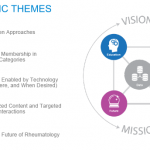
vs148 / shutterstock.com
The ACR recognizes that data are more important now than ever. As we enter what has been called the Fourth Industrial Revolution—a period of digitalization in which technology is embedded everywhere in our everyday lives—we are not just hearing constantly about the importance of data and its capabilities, we are experiencing it every day, firsthand and, in fact, in the palm of our hand. This mass collection of data at unprecedented speeds has sparked a growing demand for analytical tools and platforms that make it possible and affordable to analyze enormous datasets in fascinating new ways.
As physicians and rheumatology professionals, we have always relied on clinical and scientific data to find insights, make decisions and draw conclusions that shape how we approach our patients and think about the diseases we treat. In the business world, pivotal data are reported in financial statements, which reflect in a bottom line way how well a business is doing with its customers.
Now, with this increasing ability to do sophisticated analysis of large data sets, businesses are increasingly able to track their customers’ preferences and habits, as well as identify the frustrations customers experience with their products. Thus, a business can be empowered by advanced data analytic tools to improve its offerings to better meet its customers’ needs.
We found we had gradually created gaps between some of our departments & divisions & were not able to readily & consistently use the data we had collected to improve performance. … We knew we could do better—& we made it a priority to take the needed steps to do so.
The ACR Takes a Data-Driven Approach
At the ACR, our mission is to empower rheumatology professionals to excel in their specialty. We know we cannot meet this mission without a way to better understand the needs and perspectives of all within the rheumatology community. So how do we gain this understanding? The answer, of course, is inescapably clear: through data analysis, which transforms bytes of data into actionable information.
Having such information leads the way to the acquisition of knowledge—and with knowledge comes the potential to develop deeper understanding and the inherent advantages of greater intelligence in decision making. It should come as no surprise then that one of the principle themes of our current strategic plan is to adopt data-driven approaches. We are committed to advancing our technology infrastructure and to strengthening the ways in which we use data, so we can continuously improve our operations as an organization and better serve each of our members in more customized and personalized ways.
As the ACR has grown over the years and broadened the scope of services we offer, we have recognized that our expansion has occurred faster than our use of technology to effectively and evenly support these services. Like other professional associations of our size, we have progressively added more benefits and services to meet the rapidly evolving needs of our members in this changing healthcare environment—yet we were still collecting our data departmentally or within divisions, often using legacy systems.
Not surprisingly, we found we had gradually created gaps between some of our departments and divisions and were not able to readily and consistently use the data we had collected to improve performance. In short, our data collection efforts were fragmented, and our ability to use analytics likewise impeded. In creating our current strategic plan, we realized the impact these fragmented methods of data collection had on the level of service we were able to provide for our members. We knew we could do better—and we made it a priority to take the needed steps to do so.
We are now focused on integrating our departmental and divisional approaches to data collection and analysis in ways that will enable us to work more collaboratively across the organization. All of this, of course, requires time, even to take a few fundamental first steps. But it is happening.
We have just implemented a new Association Management System through the diligent work of our ACR staff, led by our Information Technology and Membership Development teams. The ACR staff is working tirelessly to streamline this system to specifically meet the organization’s internal needs, as well as improve our members’ experiences. This new system will allow us to scale up as we evolve, allowing us to better capture and utilize valuable data needed to better serve the needs of our members and respond to our rapidly changing environment.
The ACR has assembled a Data Steering Committee, comprising staff members representing each ACR department. This committee is the guiding body for the use of data-driven approaches operationally within the organization. Its task is to oversee all of our data to ensure they are consistently reliable, secure and compliant. Through their collaborative work, this group will devise customized solutions to ensure all decisions we make to enhance service to our members are the best solutions. Importantly, with the very formation of this committee, we are meeting one of the key objectives of our strategic plan: To become an organization that uses analytics to make better business decisions. With the Data Steering Committee, we have taken our Data-Driven Strategic Roadmap in hand and hit road.


